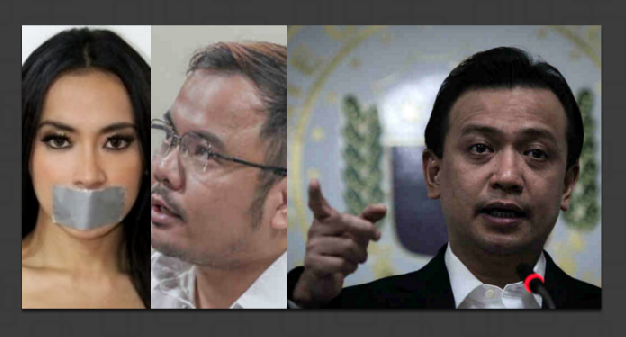
EDITOR’S NOTE: Fake news is toxic. It inflicts pain, it dumbs people down, it kills truth and may even help pave the way for autocratic rule if it is funded by the state as among its ideological apparatuses.
Should those who allegedly spread it be stopped by slapping them with criminal charges? Or should the spread of truth be enough antidote to counter their supposed poisonous propaganda?
Below is acting presidential spokesperson Harry Roque’s take on the issue in relation to Sen. Antonio Trillanes IV’s move to file cases against Assistant Secretary for Social Media Mocha Uson and blogger Rey Joseph “RJ” Nieto.
Senator Antonio Trillanes’s penchant for filing criminal defamation cases against his critics is a throwback to the medieval Star Chamber used by English tyrants to oppress dissent.
Unfortunately, he is not alone among Filipino politicians who resort to libel or related charges to suppress reportage or opinions they don’t like.
Our political firmament shakily rests on a long history of criminal prosecutions by people in power seeking to stifle free expression.
The same history also shows that every time such prosecutions are used, almost always, the result is not pretty. Our own constitution looks with askance at the use of political power to try to curtail free expression, on the understanding that there can be no enlightened citizens on which a strong government and nation stands without a wide leeway given to such a vital right.
Perhaps, if there is anyone who should understand the most the value of unbridled discussion of public issues is Senator Trillanes himself.
For the many years he was in detention because of his advocacies as a soldier, he was widely supported by the critical reportage of the press. The freedom he now enjoys he owes to a large measure to political dissent, to a contrarian spirit that helped propel his message to a broader public.
Ironically, the freedoms he spoke for while behind bars, he readily discarded as soon as he ascended into untold heights of political power.
It is true that fake news as it is understood – or not – in the digital age poses threats to the most basic notions of civility and government.
But surely, there is far greater threat to democracy when citizens are chilled by the mere thought that a senator of the realm – with all the connections, resources and political influence he has in his office – could send them to jail for the words they have said about him.
Precisely, that is what the members of the Privy Council and judges who made up the Star Chamber of 16th century England did often enough: use their parliamentary privileges to attack their political enemies.
The constitutional principle that a public office is a public trust carries with it the expectation that a public official, given the duties and privileges of his office, will allow even the most outrageous criticisms to be hurled against him.
“Men in public life may suffer under a hostile and an unjust accusation,” so said the venerable Justice Malcolm in that astonishingly prescient 1916 Philippine case of US. v. Bustos, but “the wound can be assuaged with the balm of a clear conscience.”
Whatever the slights a public official may feel under the scalpel of freewheeling – or even erroneous – public opinion on his conduct in public life, it may not be greater than societal interest in good government.
“Complete liberty to comment on the conduct of public men is a scalpel in the case of free speech. The sharp incision of its probe relieves the abscesses of officialdom,” said Justice Malcolm.
Thus, men and women in public life “must not be too thin-skinned with reference to comment upon his official acts,” because free expression is at the heart of how individual citizens may understand the benefits of self-government.
In fact, free expression is synonymous with self-government. Ironically enough, the remedy to misinformation – to fake news – is correct and accurate news or information, which may be only be realized if the government, rather than imposing censorship, encourages and supports the best practices of free expression.









